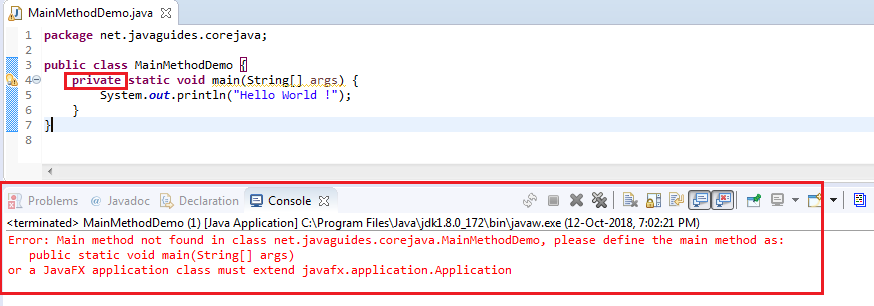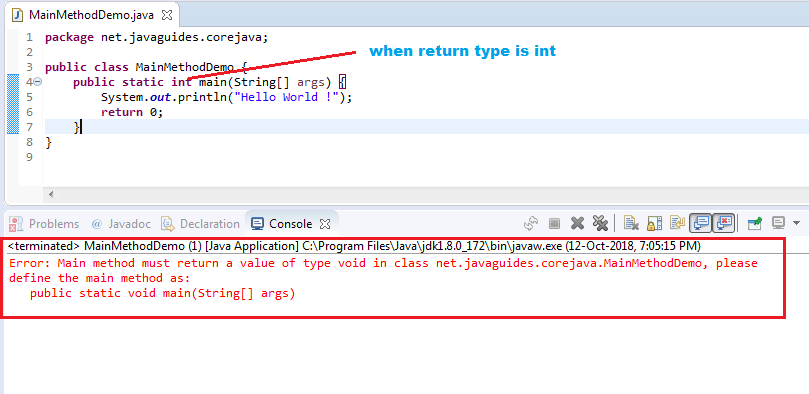🎓 Top 15 Udemy Courses (80-90% Discount): My Udemy Courses - Ramesh Fadatare — All my Udemy courses are real-time and project oriented courses.
▶️ Subscribe to My YouTube Channel (178K+ subscribers): Java Guides on YouTube
▶️ For AI, ChatGPT, Web, Tech, and Generative AI, subscribe to another channel: Ramesh Fadatare on YouTube
In this article, we will discuss frequently asked Java main() method interview questions with answers for both freshers and experienced.
As we know that Java main() method is the entry point of any Java program. Its syntax is always public static void main(String[] args).
YouTube Video
Java main() method interview Questions with Answers
We will discuss below 8 Java main() interview questions and answers:
- Why the main() method is public static?
- Can we overload the main() method in Java?
- Can we declare the main() method as private or protected or with no access modifier?
- Can we declare the main() method as a non-static?
- Can we change the return type of the main() method?
- Can the main() method take an argument other than String array?
- Can we run define Java Class without the main() method?
- Can we make the main final in Java?
I will demonstrate all the above questions with examples.
1. Why the main() method is public static?
First, let's see why the main() method is static in Java?
The main() method is static in Java, so the JVM can directly invoke it without instantiating the class’s object.If the main() method is non-static, then JVM needs to create an instance of the class, and there would be ambiguity if the constructor of that class takes an argument – which constructor should be called by JVM and what parameters should be passed? We know that JVM can’t instantiate a Java class without calling a constructor method.
The following example demonstrates why the main() method is static in Java.
We know that anyone can access/invoke a method having public access specifier. The main() method is public in Java because it has to be invoked by the JVM. So, if main() is not public in Java, the JVM won’t call it.
package net.javaguides.corejava;
public class MainMethodDemo {
public MainMethodDemo(int arg0) {
//One argument constructor
}
public MainMethodDemo(int arg0, int arg1) {
//Two arguments constructor
}
public MainMethodDemo(String arg[]) {
}
public void main(String...args) {
//Non Static main method
}
}
Now, let's see why the main() method is public?
2. Can we overload the main() method in Java?
Yes, We can overload the main() method. A Java class can have any number of main() methods. But to run the java class, the class should have a main() method with signature as public static void main(String[] args).
The diagram below demonstrates that the main() method can be overloaded:
Let's see a simple example to demonstrate main() can be overloaded:
package net.javaguides.corejava;
import java.util.Arrays;
public class MainMethodDemo {
/** Actual main method with String[] args**/
public static void main(String[] args) {
System.out.println("String[] args main method called");
main(new Double[] {
1.0,
2.0,
3.0
});
}
/** Overloaded main method with Double[] args**/
public static void main(Double[] args) {
System.out.println("Double[] args main method called");
System.out.println(Arrays.toString(args));
}
}
Output:
String[] args main method called
Double[] args main method called
[1.0, 2.0, 3.0]
3. Can we declare the main() method as private or protected or with no access modifier?
No, the main() method must be public. You can’t define the main() method as private or protected or with no access modifier. This is because to make the main() method accessible to JVM.
The below diagram shows a runtime error if you define the main() method other than public.
4. Can we declare the main() method as a non-static?
No, the main() method must be declared as static so that JVM can call the main() method without instantiating its class. If you remove ‘static’ from the main() method signature, the compilation will be successful but the program fails at runtime.
The below diagram demonstrates that the main() method should be static otherwise JVM will throw a runtime error:
5. Can we change the return type of the main() method?
No, the return type of the main() method must be void only. Any other type is not acceptable.
The diagram below demonstrates that the main() method should have a void return type:
6. Can the main() method take an argument other than String array?
No, the argument of the main method must be a String array. But, from the introduction of var args, you can pass var args of string type as an argument to the main() method. Again, var args are nothing but the arrays.
The below diagram demonstrates that the main() method should have an argument as String array or var args:
7. Can we run define Java Class without the main() method?
No, we cannot define a class without the main() method starting from Java 7. In the previous release of Java, we can have Static Initializers as an alternative:
public class MainMethodDemo
{
static
{
System.out.println("Static Initalizer");
System.exit(0);
}
}
Output: (From JDK 7)
Error: Main method not found in class Test, please define the main method as:
public static void main(String[] args)
or a JavaFX application class must extend javafx.application.Application
Output: (JDK 6)
Static Initalizer
8. Can we make the main final in Java?
Yes, you can make the main() method final.
The diagram below demonstrates that we can have the main method as the final in Java.




![[NEW] Full-Stack Java Development with Spring Boot 3 & React Build 5 Spring Boot Projects with Java: Line-by-Line Coding](https://img-c.udemycdn.com/course/750x422/5338984_4d3a_5.jpg)
















thank you so much!
ReplyDelete